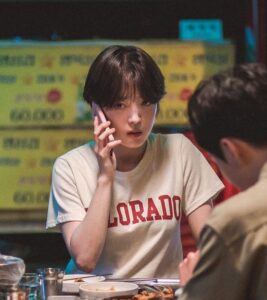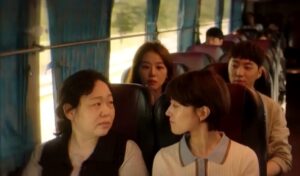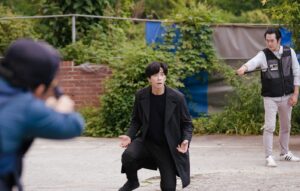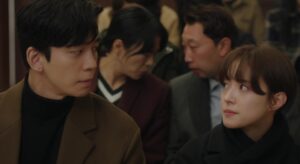
As a drama viewer, there is nothing more frustrating than a show that starts strong but ultimately crumbles into a pile of missed opportunities. This is an all too common phenomenon. Dramas have a tendency to bite off more than they can chew, leading to an almost inevitable second-act collapse.
Kairos is the exception to the rule. The show certainly has a lot on its plate, juggling dozens of timelines, as well as conspiracies both big and small throughout its run. Despite its packed plot, this thriller manages to keep itself coherent and compelling until the very end. Kairos is an underrated 2020 gem worth a watch.

Time travel is a notoriously hard plot device to manage and it’s at the center of Kairos’ story. The show begins as businessman Kim Seo-jin (Shin Sung-rok) and convenience store clerk Han Ae-ri (Lee Se-young) discover that from 10:33PM to 10:34PM daily, they can bridge a month’s time difference and communicate with each other over the phone. Ae-ri is in August, Seo-jin is in September. As both Ae-ri and Seo-jin face dire personal crises, they decide to use their unexplainable connection to pass otherwise inaccessible information to each other in a desperate attempt to change their fate.
As Kairos progresses, the consequences of these time-jumping calls become more and more dramatic. Reunions are orchestrated, crimes thwarted, deaths prevented, and at its most extreme, entire timelines are re-written. This makes for exciting television, but also a fair amount of confusion. Kairos takes steps to keep viewers on track, cleverly using warm versus cool lighting to distinguish between Ae-ri’s month behind and Seo-jin’s month ahead reality. The drama does eventually have to resort to flashing dates on the screen as the transitions between timelines increase in rapidity.
In spite of these measures, some things get lost in the shuffle. About mid-way through Kairos is when the first timeline erasure occurs. After that, certain characters start to be able to remember events from technically no-longer existing realities. It can be hard to keep track of who remembers what from which timelines, especially since Kairos doesn’t firmly establish rules regarding the why, when, and who of these memories. It is also worth noting that Kairos never fully explains the mechanics of Ae-ri and Seo-jin’s miraculous communication abilities. This will no doubt leave some viewers wanting.

All that being said, Kairos’ handling of time travel is generally successful. Ae-ri and Seo-jin’s time-bending calls frequently enhance, and rarely permanently distract from, the show’s gripping thriller narrative. However, this gimmick isn’t the main point or appeal of Kairos, which makes it easier to forgive the show’s handful of time travel-related loose threads. That honor goes to Kairos’ characters, and the refreshing takes on love and the way individual choices can shape destiny that they help the show illustrate.
The connection between Ae-ri and Seo-jin is the backbone of Kairos. Initially, they seem mismatched. Ae-ri is generous and genuine, a hard-working young woman that has faced more than her fair share of obstacles. Seo-jin seems to have a charmed life as an executive at a prestigious construction firm, although his arrogance and self-centeredness leave something to be desired. As Ae-ri and Seo-jin transform from reluctant allies into true partners, they prove to be remarkably compatible. Both are resilient, loyal, brave, resourceful, and despite Seo-jin’s first impression, fundamentally decent.
Blessedly, Ae-ri and Seo-jin’s connection is platonic. Their journey is towards a precious family-like friendship. Indeed, most of Kairos’ rich relationships center around familial love. The drama is particularly interested in the parent-child dynamic. The inciting incidents of Kairos’ story are the disappearance of Ae-ri’s beloved mother and the apparent kidnapping and murder of Seo-jin’s young daughter. These two relationships and numerous other parent-child pairings allow Kairos to explore the ways parents shape their children’s characters and visa versa, for better or worse.

One reason Kairos’ relationships are so gripping is because the show takes its time building them. It teases out dynamics over the course of the first half, even as the plot is dominated by the search for the dual missing persons. That search comes to a head in the brilliant trio of episodes 6 through 8. The ending sequence of episode 6 is especially excellent, as Ae-ri’s actions a month in the past lead to a despicable future literally flaking away before Seo-jin’s astounded eyes. It’s a visually striking and emotionally impactful moment that Kairos never quite manages to top, despite the drama’s satisfying conclusion.
That is because the show’s back end is much more deliberately-paced and convoluted than its front half, trading simple pleasures for gradual narrative payoffs. After the conclusion of its original arc in episode 8, Kairos takes a few episodes to regain its footing. It eventually creates a nice balance between personal melodrama and corporate conspiracy, all of which is given weight by the relationships that were painstakingly crafted during the drama’s opening act.
It helps that Kairos’ second half is where its compelling message about the power of personal choice comes to the fore. Dramas have a thing about destiny. It’s hard to name an iconic drama that doesn’t contend that fate is the almighty and immovable force which brings lovers together and sends villains to their rightful punishment. Kairos takes a refreshingly different approach.

There is an aspect of fate in Ae-ri and Seo-jin’s connection. Late in the show, it is revealed that their fathers were close friends. Furthermore, Ae-ri’s father saved Seo-jin’s life during a devastating building collapse. This construction accident proves to have not been an accident at all, but rather the product of corporate crime, an event at the root of our protagonists’ troubles and the ultimate motivation of their quest for justice.
Besides this shared family history though, Kairos is committed to demonstrating how each of us has the power to shape our fate through the choices we make. As Ae-ri and Seo-jin pass information through time, they convince past and future iterations of themselves and their loved ones to make choices that fundamentally shift the trajectory of their destinies.

Sometimes, our protagonists make choices that trap them in loops. Dysfunctional couple of the year Kang Hyun-chae (Nam Gyu-ri) and Seo Do-kyun (Ahn Bo-hyun) bind themselves to a pitiable cycle of self-destruction that they can’t seem to escape, even when information from different timelines gives them the opportunity to do so.
Ae-ri finds herself constantly in peril no matter how she and Seo-jin change the future and past. Only after she hunts down the source of her problems can she break the cycle of violence which threatens her. In a more poetically noble example of a loop, Seo-jin purposefully repeats his father’s choices. This leads to him dying in one timeline in a mirror of his father’s murder, thrown off a roof for trying to topple a scheming corporate tycoon. His choice to sacrifice himself gives our heroes, including an earlier and still living version of himself, what they need to finally defeat the villains who seek to destroy them.
Contrary to the story of Hyun-chae and Do-kyun, the characters of Kim Jin-ho (Ko Kyu-pil) and Im Geon-wook (Winner’s Kang Seung-yoon) show what can happen when people on a dark path make a different choice. At the start of Kairos, both Jin-ho and Geon-wook commit separate desperate crimes. In certain timelines, they are each condemned to violent fates because of their actions. But because Jin-ho and Geon-wook begin to make different choices, choices of bravery and selflessness, both ultimately end up in a redemptive place.

What Kairos seems to be saying is that even if mistakes have been made, no person is inevitably fated to be good or bad. You get to choose. The show also contends that no matter the odds, our fates are mostly in our own hands. Ae-ri, Seo-jin, and company go up against formidable foes throughout Kairos. Nevertheless, they continue fighting. More importantly, they learn from prior missteps and evolve. Because of these decisions, they eventually triumph. In the world of Kairos, destiny isn’t something that shapes you, but rather a thing that is shaped by you, forged one choice at a time.
Kairos was accurately marketed as a time-travel thriller, but you could also call it an empowering ghost story. The show is filled with influential incorporeal beings, either literally deceased loved ones who left important breadcrumbs, or voices passing crucial information by phone from another reality. Together, these ordinary people defy the laws of time to bring a seemingly unstoppable web of evildoers to justice. When the fight is won and the need for metaphysical intervention ceases, the time-jumping calls stop. Of course, there is always another challenge around the corner, as Kairos’ final shot of a mysteriously ringing phone hints. But for now, the ghosts can rest and the living can move forward in peace.
It is rare to find a show like Kairos which juggles so many things with such satisfying results. Ambitious and entertaining, this drama takes viewers on a thrilling and thought-provoking ride. Kairos may not be a particularly jolly show, but it is hard not feel happy after watching a drama this good.
(Images via MBC, Viki)


